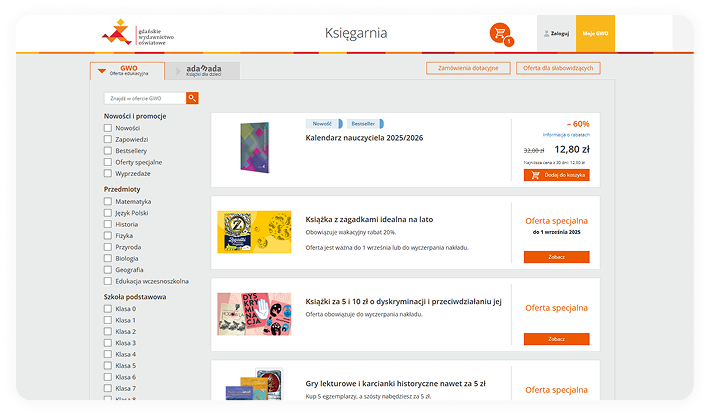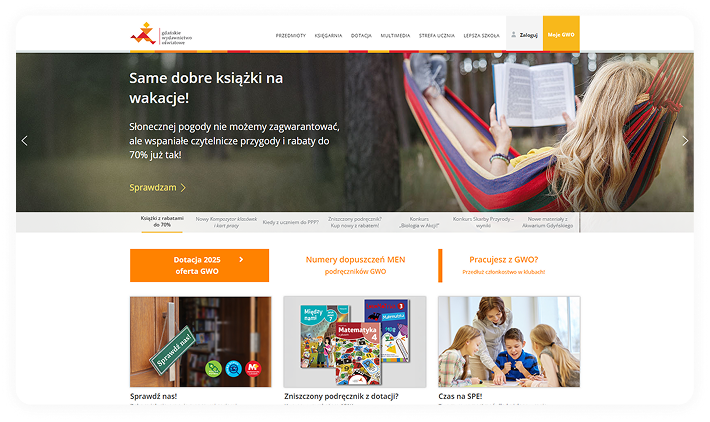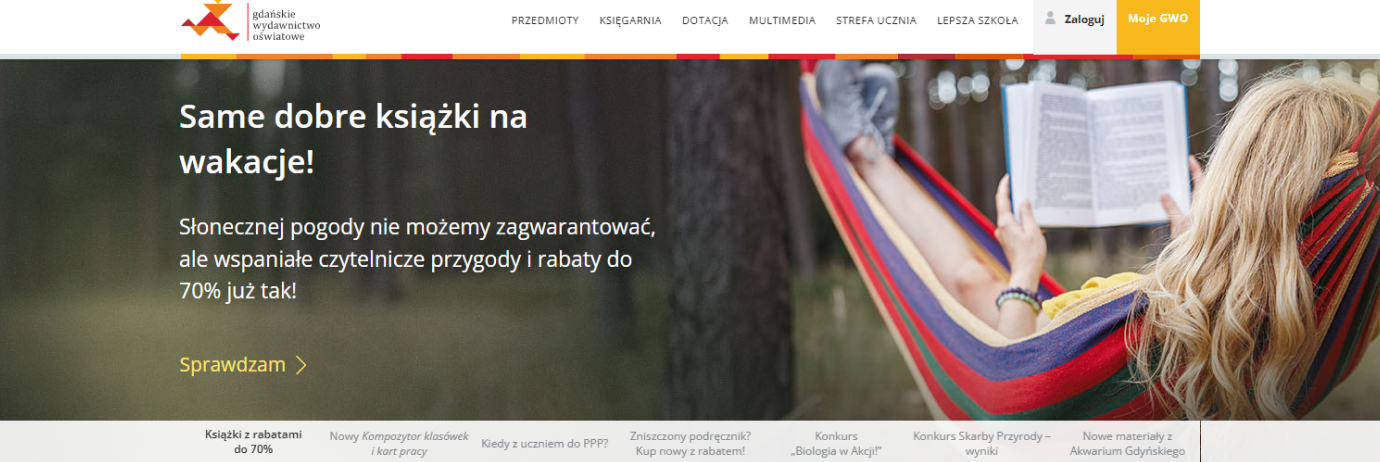
GWO is one of the first privately owned educational publishing houses in Poland, established in 1991, and currently ranks as the second most popular textbook publisher
in the country. Their flagship mathematics series, “Matematyka z plusem,”
is used by the majority of primary school students in Poland.
GWO specializes in creating comprehensive educational materials for Polish schools, covering multiple subjects including mathematics, Polish language, history, physics, biology, and art. Over the years, the company has expanded beyond traditional textbooks to offer digital solutions, including online courses (Matematura.pl, Matlandia, Gimplus), interactive historical maps, and online applications for teachers, as well as e-books and digital learning materials.
For that reason, GWO established its own development team responsible for managing online sales channels, developing applications, and taking care of external integrations.


The biggest pain points of the existing platform were technical debt and poor testability, which translated into obstacles in extending the platform and introducing new features, as well as high maintenance costs. The GWO platform was based on an internal architecture and framework, making it difficult to onboard new employees. On top of that, the technical debt prevented them from adopting new technological solutions.
The primary objective was to prioritize ease of maintenance for current solutions and enable rapid development of new functionalities. High flexibility of the platforms was essential to continuously adapt to changing market requirements. The fundamental goal regarding sales platforms was to integrate all sales channels into one unified system and standardize purchasing processes across different touchpoints.
The big picture involved creating a future-proof, maintainable platform that could support business growth while reducing operational efforts and technical complexity.
Several years ago, GWO decided to migrate from the old framework to a much newer and more stable technology. This process primarily affected the sales platforms. Currently, every channel related to publishing offerings for different target groups is being migrated to Sylius, with the possibility that eventually all sales channels will be handled through it.
The main challenge was “rebuilding the engine while the car was still driving” – working on the system that had to remain operational continuously, and customers couldn’t experience any instability during the implementation of changes. Given the non-standard requirements, ease of modification and high performance were crucial in this project.
A fundamental requirement in the project was using Symfony as the foundation of the technology stack. Additionally, GWO required a ready-to-use administrative panel, working directly in PHP.
The ability to quickly create our own theme for the sales (non-administrative) part was very important to the company, as was the ease of modifying the shop’s functionality to meet the specific needs. The use of API was also significant, especially since Sylius was based on API Platform.
Sylius, although it was just beginning to enter the market at that time, met all these requirements while also being well-tested, developmentally stable (minimal breaking changes between releases), and offering optimal performance. A major advantage of Sylius was the separation and use of independent packages such as Sylius Resource Bundle and Sylius Grid Bundle, which GWO could also use in other projects independently while maintaining a common technology stack.
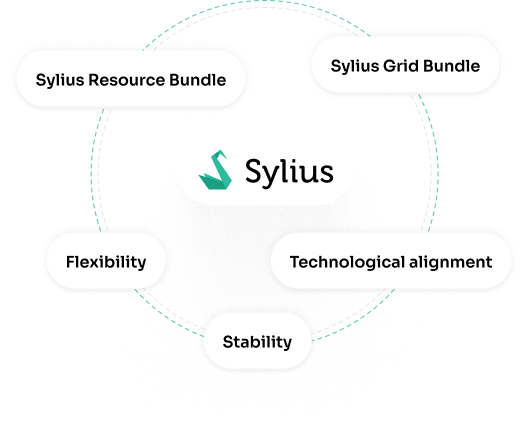
The decision ultimately came down to Sylius offering the perfect balance of flexibility, stability, and technological alignment with the existing infrastructure. Unlike other eCommerce solutions that would have required GWO to adopt entirely new technologies or compromise on their architectural principles, Sylius seamlessly integrated into the Symfony-based ecosystem while providing the customization capabilities essential for the unique publishing industry requirements.
GWO has its own development team and doesn’t rely on external agencies. While Sylius isn’t their only framework within the department, it has become the primary technology for handling their “bookstore” channels – they operate several different bookstores targeting various customer segments. The migration of their main retail bookstore, complete with a custom theme and additional functionalities, took a team of 3 developers approximately 5 months to complete.
3 developers
5 months
Custom theme
Additional functionalities
Sylius deployed in a dockerized version on our own servers
Implementation started with version 1.6 as a proof of concept
Initially introduced for channels with relatively low traffic loads
Currently handles the vast majority
of our traffic

PayU payment gateway implemented via BitBag plugin
Empik integration
(one of the biggest marketplaces in Poland)
Softlab (Asseco ERP)
Training system integration
Internal CRM system
Although Sylius didn’t directly impact sales, its core benefit was easier management of product offers by administrators and the ability to introduce additional features such as special offers, which allow the promotion department to build more complex and configurable offer mechanisms for individual customers.
What’s more, it contributed to improving the search mechanism compared to our previous system. The fact that it’s based on Symfony and API Platform makes it easier for GWO to onboard new team members and enables faster delivery of specific business requirements.
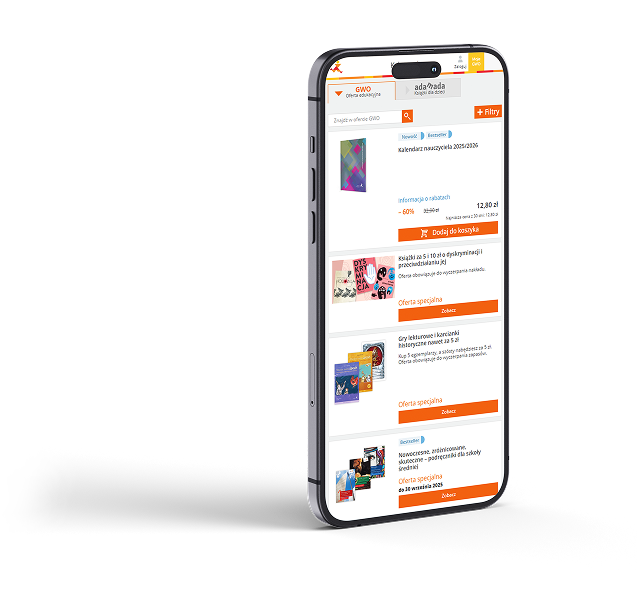
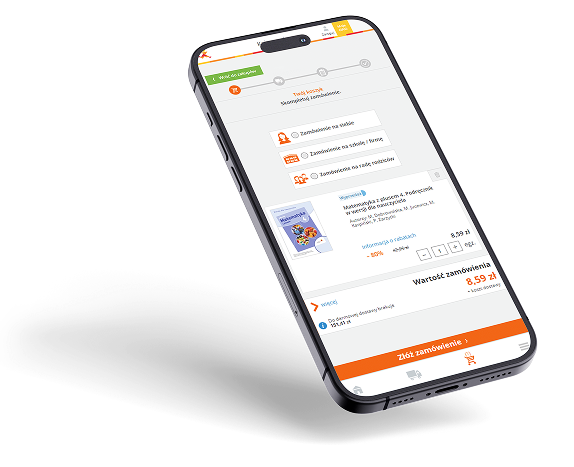
Currently, GWO processes approximately 350,000 orders annually without experiencing performance issues. This remains true even though some of their solutions or Grid Resource Bundle simplifications aren’t optimal in terms of database queries. Very occasionally, they experience some downtime related to server resource saturation, but these incidents are so sporadic and unrelated to website traffic that they don’t require any specific action at this time.
